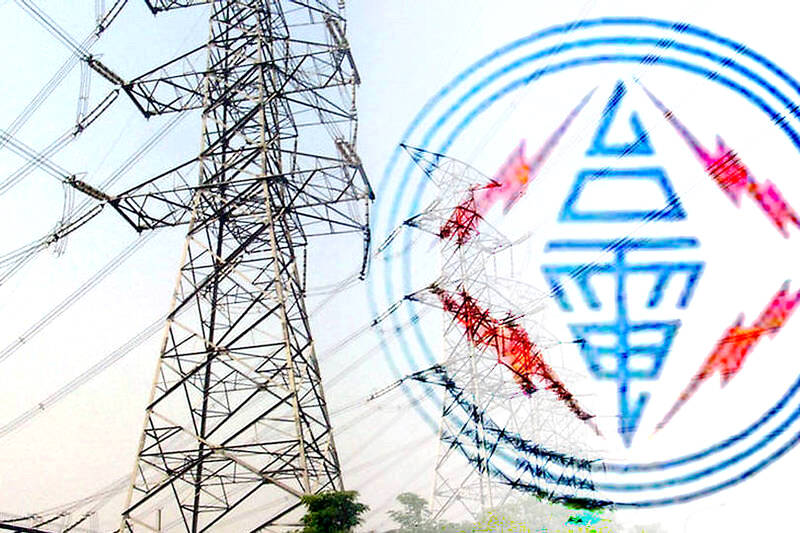The Cabinet yesterday approved draft amendments to the Electricity Act (電業法) to boost green power trading by regulating on-grid energy storage and demand response services.
Deputy Minister of Economic Affairs Ho Chin-tsang (何晉滄) told a post-Cabinet meeting news conference that 38 of the more than 80 domestic renewable energy vendors have already begun to sell their products.
Once the bill is passed by the legislature, it would facilitate the sale of residual electricity, with prices decided by the market, he said.

Photo: Taipei Times
The Ministry of Economic Affairs said in a statement that substantial funding is required to construct power and grid infrastructure, as the power dispatching system is facing challenges from renewable energy and extreme weather, while the government is striving to stabilize power supply and achieve its goal of net zero transition.
Under such circumstances, state-run Taiwan Power Co (Taipower) is expected to be maintained as a vertically integrated electric utility that combines resources related to power generation, dispatch, distribution and sales, it said.
The current act enables renewable energy vendors to sell electricity only to users, while emerging power resources such as energy storage and demand response measures are not explicitly legalized, the ministry said.
Given that renewable energy products and new power resources continue to enter the market, the domestic power trading platform must be reviewed and improved, it said.
Therefore, the act would be amended in line with the practical developments of the electricity market to introduce necessary regulations and address the aforementioned problems, the ministry said, adding that the amendments aim to boost green power trading on the premise of stable power supply.
To deal with transitions in the electric power structure and the market, as well as enable efficient management and open competition, the amendments would go in four directions, it said.
First, Taipower would keep the current operating model without divestiture to synergize resources via its power grid, increasing investment efficiency and maintaining stable power supply.
Second, renewable energy vendors would be allowed to sell energy to each other to increase their operational flexibility.
Third, on-grid energy storage and demand response services would be stipulated to reduce the compliance risk for vendors and include more potential power resources.
Last, the regulatory mechanism for the power trading platform would be strengthened to ensure its impartiality, and the market’s openness and transparency, the ministry said, adding that the platform might develop into an independent trading entity depending on market developments.
The revision of the act would help to build a friendly environment for domestic green power development, as well as enhance the power sector’s operational efficiency, the power grid’s resilience, and users’ rights and benefits, it said.

An essay competition jointly organized by a local writing society and a publisher affiliated with the Chinese Communist Party (CCP) might have contravened the Act Governing Relations Between the People of the Taiwan Area and the Mainland Area (臺灣地區與大陸地區人民關係條例), the Mainland Affairs Council (MAC) said on Thursday. “In this case, the partner organization is clearly an agency under the CCP’s Fujian Provincial Committee,” MAC Deputy Minister and spokesperson Liang Wen-chieh (梁文傑) said at a news briefing in Taipei. “It also involves bringing Taiwanese students to China with all-expenses-paid arrangements to attend award ceremonies and camps,” Liang said. Those two “characteristics” are typically sufficient

A magnitude 5.9 earthquake that struck about 33km off the coast of Hualien City was the "main shock" in a series of quakes in the area, with aftershocks expected over the next three days, the Central Weather Administration (CWA) said yesterday. Prior to the magnitude 5.9 quake shaking most of Taiwan at 6:53pm yesterday, six other earthquakes stronger than a magnitude of 4, starting with a magnitude 5.5 quake at 6:09pm, occurred in the area. CWA Seismological Center Director Wu Chien-fu (吳健富) confirmed that the quakes were all part of the same series and that the magnitude 5.5 temblor was

The brilliant blue waters, thick foliage and bucolic atmosphere on this seemingly idyllic archipelago deep in the Pacific Ocean belie the key role it now plays in a titanic geopolitical struggle. Palau is again on the front line as China, and the US and its allies prepare their forces in an intensifying contest for control over the Asia-Pacific region. The democratic nation of just 17,000 people hosts US-controlled airstrips and soon-to-be-completed radar installations that the US military describes as “critical” to monitoring vast swathes of water and airspace. It is also a key piece of the second island chain, a string of

The Central Weather Administration has issued a heat alert for southeastern Taiwan, warning of temperatures as high as 36°C today, while alerting some coastal areas of strong winds later in the day. Kaohsiung’s Neimen District (內門) and Pingtung County’s Neipu Township (內埔) are under an orange heat alert, which warns of temperatures as high as 36°C for three consecutive days, the CWA said, citing southwest winds. The heat would also extend to Tainan’s Nansi (楠西) and Yujing (玉井) districts, as well as Pingtung’s Gaoshu (高樹), Yanpu (鹽埔) and Majia (瑪家) townships, it said, forecasting highs of up to 36°C in those areas